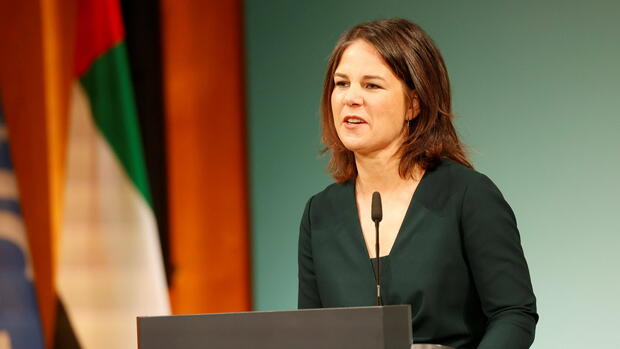The German Foreign Minister calls for a return to a path towards the 1.5 degree target.
(Photo: IMAGO/Metodi Popov)
Berlin Foreign Minister Annalena Baerbock is aiming for a goal for the global expansion of wind power and solar energy. The Greens politician announced this at the start of the “Petersberg Climate Dialogue” on Tuesday in Berlin.
The G7 countries have already agreed on such goals. “I am committed to ensuring that we also agree on a global target for renewable energy and energy efficiency,” Baerbock said.
The two-day Petersberg Climate Dialogue, which Germany has been holding every spring for the past 13 years, is considered a working conference and important preparation for the two-week United Nations Climate Change Conference at the end of the year, known as “COP” for short. In contrast to the COP, however, only representatives from around 40 countries, including industrialized nations, island states and emerging countries, take part in the Petersberg Climate Dialogue. Baerbock described them as those states “that really want to find solutions to contain the climate crisis”. Chancellor Olaf Scholz (SPD) will also speak at the conference on Wednesday.
According to the Foreign Minister, the meeting is not about the “lowest common denominator”, but about solutions that lead to the 1.5-degree path.
Global warming of 1.5 degrees compared to pre-industrial times is considered the limit for containing the effects of climate change to a level that is just tolerable. The international community of states has agreed on this value.
Intergovernmental Panel on Climate Change sees 1.1 degrees of global warming so far
In March, the Intergovernmental Panel on Climate Change put global warming at 1.1 degrees Celsius compared to the second half of the 19th century. According to the scientists, this alone has led to more frequent and more intense extreme weather events.
>> Read here: Intergovernmental Panel on Climate Change report – The 1.5 degree target could be exceeded by 2040
At the first Petersberg Climate Dialogue in 2010, scenarios and forecasts for the climate crisis were still being discussed, said Baerbock. “But today we are talking about a crisis that is there, in reality, in the here and now, in the now.” The climate crisis is “the greatest security challenge of our century”. Because where the climate crisis deprives people of their livelihood, it exacerbates conflicts and crises that could destabilize regions.
Several trillion euros needed for poorer countries
According to Baerbock, the rich countries of the world will keep their long-standing promise to financially support poorer countries in climate protection this year. “The good news is, as it stands now, we’re on track to finally hit $100 billion this year,” she said. This sum is to be made available annually in the future.
At the Petersberg Climate Dialogue last year, Chancellor Scholz pledged to increase Germany’s contribution to international climate finance to at least six billion euros a year by 2025 at the latest. According to the development and environmental organization Germanwatch, however, there is no growth path in the budget that would ensure that this goal is actually achieved.
Jan Kowalzig from the welfare association Oxfam also said that in order to meet the federal government’s commitment, annual payments should have been gradually increased since 2021. But that didn’t happen.
Baerbock explained that “several trillions” are needed for climate protection and adaptation to increasing global warming. “Public funds alone will not be able to meet this need. That’s why it’s a matter of mobilizing massive private funds as well.” Together with the USA, Germany is committed to reforms at the International Monetary Fund (IMF) and the World Bank. Climate finance must become an integral part of the World Bank’s business model.
Skepticism about UAE credibility
This year’s world climate conference COP28 begins at the end of November in the United Arab Emirates (UAE). The president of the conference is Sultan Ahmed al-Dschaber, Minister of Industry of the UAE and also head of the state-owned oil company Adnoc, who promised a determined fight against climate change in Berlin.
The president of the next climate conference is controversial because of possible conflicts of interest.
(Photo: IMAGO/Metodi Popov)
But environmentalists are skeptical about its credibility. Greenpeace is “deeply concerned” about the personnel, said the executive director of Greenpeace Germany, Martin Kaiser, of the dpa news agency. Kaiser spoke of a dangerous precedent and an unprecedented conflict of interest. “It’s as if the Federal Environment Agency was headed by the head of VW.” The United Nations should put a stop to that.
Germanwatch pointed out that it was not just the expansion of renewables that had to be promoted. Less coal, oil and gas must also be burned. The United Arab Emirates, on the other hand, wanted to allow the oil and gas countries to significantly expand the production of fossil fuels if the CO2 was separated and stored underground, it was said critically. This costs a lot of energy, and greenhouse gases would still be produced.
More: Extreme drought – Lake Garda is only 43 percent full
